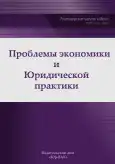Typological schemes for the formation of digital space in russian industry: key elements and boundaries of application
- Autores: Obolenskaya L.V.1, Bekulova S.R.1
-
Afiliações:
- Financial University under the Government of the Russian Federation
- Edição: Volume 19, Nº 5 (2023)
- Páginas: 264-269
- Seção: Regional and Sectoral Economics
- URL: https://journal-vniispk.ru/2541-8025/article/view/252636
- DOI: https://doi.org/10.33693/2541-8025-2023-19-5-264-269
- EDN: https://elibrary.ru/CKQWTR
- ID: 252636
Citar
Resumo
The object of study in the article is a variety of typological schemes for the formation of the digital space of industry. In the context of a systems approach, the goal is to develop a classification of objects of this set for use in Russian practices. At the same time, attention is focused on two significant classification features of the schemes for the formation of digital space of industry: the boundaries of application and the structural elements used. Two problems are solved: (1) identification of options for spatial-sectoral boundaries of the application of typological schemes and (2) identification of the types of structural elements used. The methodological basis of the study is the classification approach, methods and means of systemic and economic analysis, generalization and interpretation of the collected information. Based on the results of the study, it is concluded that the use of the proposed and other classification criteria will be useful in creating a structured base of typological schemes that ensures clarity and convenience of information and analytical work in the formation of the digital space of industry. It is advisable to create such a structured base within the Russian GISP system.
Texto integral
##article.viewOnOriginalSite##Sobre autores
Lyudmila Obolenskaya
Financial University under the Government of the Russian Federation
Autor responsável pela correspondência
Email: OVObolenskaya@fa.ru
ORCID ID: 0000-0002-1016-9171
Código SPIN: 7461-0270
Scopus Author ID: 57204951512
Cand. Sci. (Eng.), Leader research associate, Institute for Financial and Industrial Policy
Rússia, MoscowSusanna Bekulova
Financial University under the Government of the Russian Federation
Email: SRBekulova@fa.ru
ORCID ID: 0000-0003-1384-4694
Código SPIN: 8772-6960
Junior Researcher at the Institute of Financial and Industrial Policy
Rússia, MoscowBibliografia
- Abramov V.I., Borzov A.V., Semenkov K.Yu. Assessing the readiness of small and medium-sized enterprises for digital transformation // Issues of innovative economics. 2022. Volume 12. No. 3. pp. 1573–1596. (rus). doi: 10.18334/vinec.12.3.115000.
- Avilova V.D., Ulmaskulov T.F. Prospects for the application of Industry 4.0 technology in Russian industry // Basis. 2018. No. 1 (3). pp. 13–18. (rus).
- Glezman L.V., Butorin S.N., Glavatsky V.B. Digitalization of industry as a factor in the technological development of the regional spatial-industrial structure // Issues of innovative economics. 2020. Volume 10. No. 3. pp. 1555–1570. (rus). doi: 10.18334/vinec.10.3.110762.
- Zubritskaya I.A. Analysis of world experience in digital transformation of industry: institutional model // Digital transformation. 2019. No. 1 (6). P. 21–35. (rus). doi: 10.38086/2522-9613-2019-1-21-35.
- «Industry 4.0»: creating a digital enterprise. Worldwide review of the implementation of the Industry 4.0 concept for 2016. —M: PwC, —2017. —12 p. (rus). URL: http://resolution-correct.rf/sites/default/files/global_industry-2016_rus.pdf (access date: 10.04.2023).
- Korovin G.B. Agent-based model of digitalization of industry in the region // Bulletin of the Transbaikal State University. 2022. No. 7. Pp. 104–114. (rus). doi: 10.21209/2227-9245-2022-28-7-104-114.
- Lepesh G.V. Digital transformation of the industrial sector of the economy // Technical and technological problems of the service. 2022. No. 2 (60). Pp. 3–15. (rus).
- Makarov V.M., Lukina S.V., Ovchinnikov S.A. Relevance of regulation of corporate digital transformations // RITM mechanical engineering. 2020. No. 9. Pp. 24–28. (rus). URL: https://ritm-magazine.com/ru/public/aktualnost-reglamentacii-korporativnyh-cifrovyh-transformaciy (access date: 09.04.2023).
- Merzlov I.Yu., Shilova E.V., Sannikova E.A., Sedinin M.A. Comprehensive methodology for assessing the level of digitalization of organizations // Economics, entrepreneurship and law. 2020. Volume 10. No. 9. Pp. 2379–2396. (rus). doi: 10.18334/epp.10.9.110856.
- Methodological recommendations for the digital transformation of state corporations and companies with state participation (approved by the Ministry of Digital Development of Russia) (rus). // SPS ConsultantPlus.
- Safiyanov D.R. Digital transformation of business models of domestic organizations. (rus). URL: https://strategy24.ru/04/news/tsifrovaya-transformatsiya-biznesmodeley-otechestvennykh-organizatsiy (date of access: 25.03.2023).
- Digital maturity. Methodology for assessing the digital maturity of an organization. (rus). URL: https://www.chelidze-d.com/post/digital-transform (access date: 25.03.2023).
- Yachmeneva V.M., Yachmenev E.F. Digital space as a necessary and sufficient condition for the digitalization of the economy // Baikal Research Journal. 2020. No. 3. (rus). URL: https://cyberleninka.ru/article/n/tsifrovoe-prostranstvo-kak-neobhodimoe-i-dostatochnoe-uslovie-tsifrovizatsii-ekonomiki (access date: 19.03.2023).
- A common data space 4.0 for European manufacturing. The Digital Factory Alliance. URL: https://digitalfactoryalliance.eu/ (access date: 21.10.2023).
- A European Common Digital Manufacturing Infrastructure and Data Space Pathway for Connected Factories 4.0. Data Value Chain Governance. URL: https://ec.europa.eu/info/funding-tenders/opportunities/portal/screen/opportunities/topic-details/digital-2021-cloud-ai-01-prep-ds-manufact (access date: 21.10.2023).
- Alekseev, A., Novitsky N. The concept and technology of a unified digital space organizing of an operational enterprise as a necessary condition for the intelligent automation of pipeline systems. IOP Conference Series Materials Science and Engineering. 2019. 667(1):012003. doi: 10.1088/1757-899X/667/1/012003.
- Alsufyani N., Gill A. Q. Digitalisation performance assessment // A systematic review. Technology in Society. 2022. Vol. 68. doi: 10.1016/j.techsoc.2022.101894.
- Butt, J. A Conceptual Framework to Support Digital Transformation in Manufacturing Using an Integrated Business Process Management Approach. Designs. 2020. No. 4. P.17. doi: 10.3390/designs4030017.
- Economic Commission for Latin America and the Caribbean (ECLAC), Digital technologies for a new future (LC/TS.2021/43), Santiago, 2021.—URL: https://www.cepal.org/sites/default/files/publication/files/46817/S2000960_en.pdf (access date: 21.10.2023).
- Fernández-Portillo А., Almodóvar-González М., Sánchez-Escobedo V. C., Coca-Pérez J. L. The role of innovation in the relationship between digitalisation and economic and fi nancial performance. A company-level research // European Research on Management and Business Economics. 2022. Vol. 28, Issue 3. doi: 10.1016/j.iedeen.2021.100190.
Arquivos suplementares












